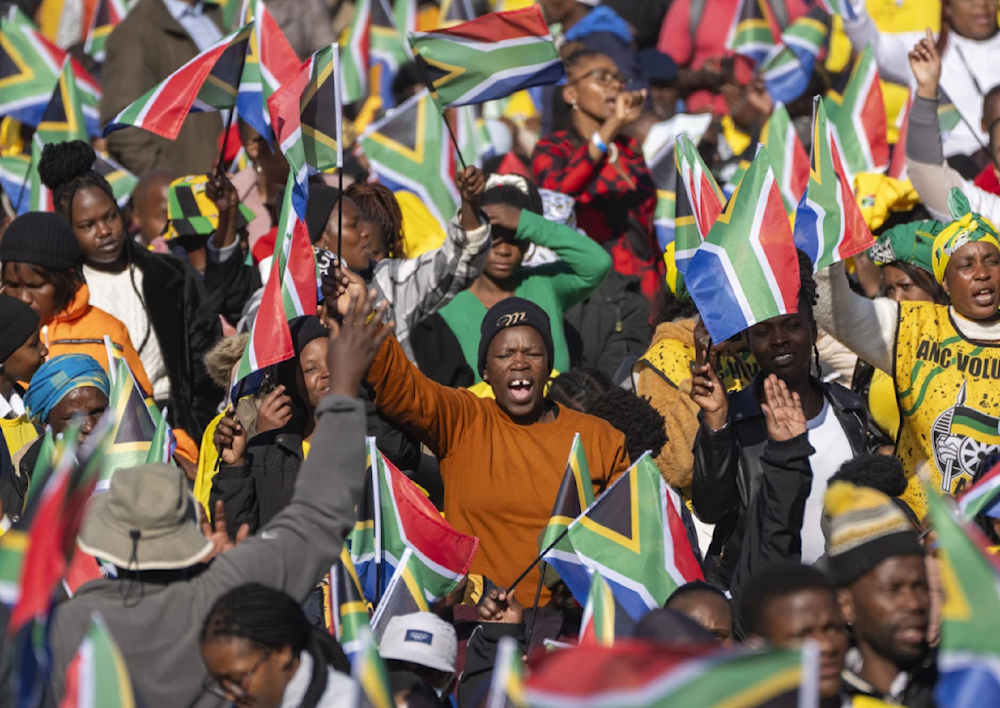10 South Africa parties agree to form national unity government
The 10 parties in question have earned 70% of the vote in the 2024 elections, according to an ANC statement.
-

South Africans gather ahead of the inauguration of South Africa's Cyril Ramaphosa as President at the Union Buildings South Lawns in Pretoria on June 19, 2024. (AP)
South Africa's ruling African National Congress (ANC) party announced Sunday that 10 political parties in the country have agreed to establish a government of national unity.
In an X post, the party wrote it was "pleased to welcome the 10 founding political parties to the Government of National Unity as follows: ANC, PA [Patriotic Alliance], DA [Democratic Alliance], IFP [Inkatha Freedom Party], GOOD, PAC [Pan Africanist Congress of Azania], FF+ [Freedom Front Plus], UDM [United Democratic Movement], Rise Mzansi and Al Jamah."
The 10 parties earned 70% of the vote in the 2024 elections, according to a joint statement released by the ANC on X.
The ANC is pleased to welcome the 10 founding political parties to the Government of National Unity as follows: ANC, PA, DA, IFP, GOOD, PAC, FF+, UDM, Rise Mzansi and Al Jamah.#GNU#LetsDoMoreTogether pic.twitter.com/uMedrCA6sJ
— African National Congress (@MYANC) June 23, 2024
The parties have begun discussions to construct executive governmental entities, and the outcomes will be disclosed by South African President Cyril Ramaphosa in the coming days, according to the statement.
Earlier in June, the ANC, which lost its legislative majority in previous elections, and the opposition DA party agreed to establish a government of national unity, according to DA leader John Steenhuisen.
The results of South Africa's general elections, conducted on May 29, were released on June 2. The ANC won 159 of the country's 400 national parliament seats. The Democratic Alliance party came in second with 87 seats.
The uMkhonto WeSizwe Party (MK Party) finished third in terms of seats, securing 58 seats in the national legislature. Prior to the elections, the MK Party, led by former South African President Jacob Zuma, and at least 20 other parties accused the electoral commission of vote-rigging.
Reelected South African President Cyril Ramaphosa was inaugurated on Wednesday, pledging to uphold and enforce the republic's fundamental and other laws.
Ramaphosa was reelected for a second term by lawmakers, following a historic coalition agreement between his African National Congress (ANC) of the late Nelson Mandela and the Democratic Alliance (DA), setting aside their long-standing rivalry.
Ramaphosa secured the late Friday vote with 283 votes, defeating Julius Malema, leader of the far-left Economic Freedom Fighters (EFF), who received 44 votes.
Although leading opposition parties such as MK Party and the Economic Freedom Fighters (EFF) have their roots in the ANC, the parties have starkly set themselves apart due to past in-party disputes that led to the formation of MK and EFF.
Historically, the ANC, led by President Cyril Ramaphosa, and the DA have been rivals, with the DA leading the opposition from 1999 until the 2024 elections. On the other hand, the ANC, coming out of the South African revolution led by Nelson Mandela, has held a near majority position in the South African National Assembly since 1994.
However, this year, the ANC suffered a resounding setback of 71 seats in the National Congress, forcing it to form a coalition government with the DA.

 3 Min Read
3 Min Read










